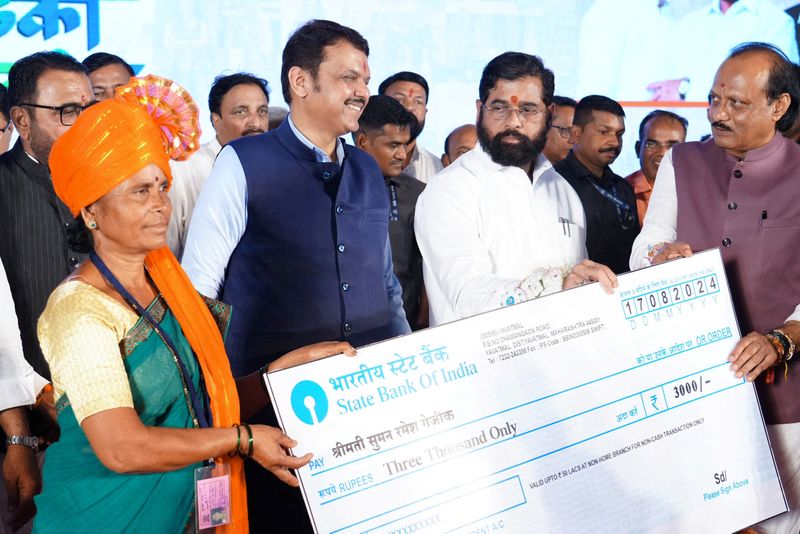Analysis-Modi’s populism after India election reversal puts public finances at risk
2024.08.30 06:34
By Krishna N. Das and Aftab Ahmed
NEW DELHI (Reuters) – After reverses in the general election and facing possible losses in state polls this year, Indian Prime Minister Narendra Modi’s coalition has stepped up cash handouts, debt waivers and other freebies, although he has previously criticised the policy.
The handouts by state governments and promises by opposition parties trying to match the largesse threaten to upset the fiscal balance in the world’s most populous nation and disrupt spending on urban infrastructure and other development projects, analysts say.
Modi’s Bharatiya Janata Party (BJP) lost its parliamentary majority in the April-June national election and has stayed in power with the help of fickle allies. Opinion polls predict it could lose provincial elections due in Maharashtra, Haryana, and Jammu and Kashmir later this year, while winning in Jharkhand state, which could further dent Modi’s popularity.
Maharashtra, India’s richest state and ruled by a BJP coalition, has raised its fiscal deficit target to 2.6% of state GDP for the current fiscal year from 2.3% in an interim budget in February. The latest budget has listed cash handouts for women and free electricity for some farmers that could cost it about 960 billion rupees ($11.45 billion) in total this fiscal year, or 2.2% of state GDP, according to research and investment firm Emkay Global.
BJP-ruled Haryana has waived water dues for thousands of farmers, cut prices of cooking gas for millions of poor families and announced allowances for unemployed youth.
Inflation, unemployment and rural distress emerged as key issues in the general election and surveys show these remain uppermost ahead of the state elections.
“Although doles are not a new phenomenon, it is the prevalence of populist promises in this cycle across the political spectrum that is worrying,” said Madhavi Arora, an economist at Emkay.
“The recent wave of populist spending across poll-bound states could upset the fine fiscal balancing act that had been playing out so far.”
Opposition promises include free power to homes and monthly allowances to women.
Modi in the past has decried the practice.
“This culture of freebies is very dangerous for the development of the country,” he said in 2022.
“The people following this culture will never build new expressways, airports or defence corridors for you. They feel that they can buy the people by distributing freebies to them. Together we have to defeat this approach and remove the freebies culture from the politics of the country.”
Yashwant Deshmukh, founder of polling agency CVoter, said politicians will increasingly resort to freebies amid widening economic disparity, especially in the absence of emotive issues like tensions with India’s arch enemy Pakistan which helped the BJP in the 2019 national elections.
“The fiscal consequence of this culture is devastating, but there is a big yearning among the masses for such social welfarism,” he said.
‘RIGHT AMOUNT OF POPULISM’
Other analysts have said the BJP’s main plank of Hindu nationalism, aimed at the country’s majority, is not as effective as it has been in the past.
To be sure, the BJP has used handouts to win votes earlier too, but economists and political analysts say the party now goes head to head or even surpasses the opposition in promising such doles.
A BJP official, who did not want to be named, said the party was responding to public feedback after the general election setback and working on populism without ruining public finances.
“We will strive for the right amount of populism,” he said. “Considering what happened in the 2024 election, we are treading very cautiously. Where we went wrong, we do collective introspection and then we act upon it.”
BJP spokespersons did not respond to requests for comment or declined to comment.
Modi has taken several other populist decisions which take effect across the country.
He recently reversed a decision to reduce some tax benefits while selling real estate after a middle-class backlash, and also rolled out a pension plan for federal government employees that will cost the exchequer about 62.5 billion rupees ($745 million) this fiscal year. The government raised its share of the contribution to 18.5% of a person’s basic salary from 14% earlier.
Recently announced budgets of five states, including Maharashtra and other BJP-ruled states like Madhya Pradesh, Odisha and Rajasthan, have pegged their average fiscal deficit at 3.2% of state GDP, 20 basis points higher than their interim budgets earlier this year mainly because of a rise in their revenue spending on populist measures, according to Elara Securities.
The brokerage firm said the deficit could further slip by up to 30 basis points. Ultimately, it said, fiscal slippage in the states would play into the federal budget.
“The Centre-State divergence with respect to spending priorities and fiscal consolidation is getting amplified, and this means consolidated fiscal deficit in India may consolidate only gradually.”
Christian de Guzman, a Moody’s (NYSE:) sovereign rating analyst, told Reuters there was “not going to be a fiscal blowout by any means (but) you’re not going to see very drastic improvements as well”.

“The government right now is in a weaker position to hammer home material revenue measures as compared to prior to the (general) election,” he said.
($1 = 83.9340 Indian rupees)








